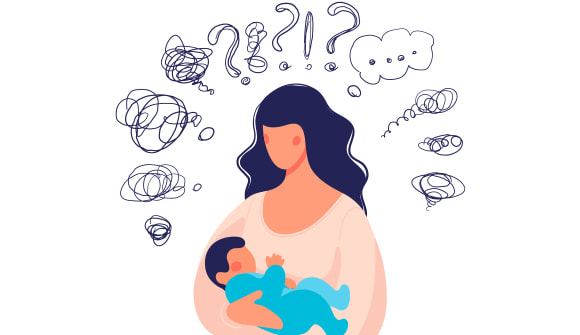Moms and mental health
Postpartum anxiety and depression are difficult, but support is waiting.
Article Author: Katie McPherson
Article Date:

Having a newborn baby is, well, a lot of things. It’s exciting. It’s nerve-wracking. It’s joyful. It’s challenging. And all of those emotions — especially when you don’t feel like the perfect mom, even in a state of post-baby bliss — can pile onto each other quickly. That’s why it’s so important for moms- and dads-to-be to know about postpartum mood disorders ahead of time, so they can be on the lookout for symptoms and empower themselves to find help if they need it.
What is PMAD?
PMAD stands for perinatal mood and anxiety disorder, and is a broad category that includes conditions like postpartum depression, postpartum anxiety, post-traumatic stress disorder and postpartum obsessive-compulsive disorder.
Candice Franco, PhD, is a psychologist at Baptist Behavioral Health. She helped develop the Maternal Mental Health program at Baptist Health, which focuses on helping new mothers dealing with PMADs after birth. She explains that all the major changes a woman’s body endures during pregnancy and the postpartum period contribute to causing PMADs.
“What we know is that hormones are all over the place, and there are going to be a lot of rapid, dramatic hormone shifts after delivery,” she explained. “That has implications for how a woman will experience her life emotionally. We would expect emotions to be all over the place. Sometimes that’s really confusing for women who have always been able to trust their emotions, but now they don’t know what to do. There’s definitely a mind-body connection.”
Who is at risk?
Dr. Franco said that PMADs can affect “women across all socioeconomic statuses, races and cultures.” But there are some known risk factors that may make one new parent more likely than another to develop a postpartum mental health condition.
“Any time there’s a personal history of anxiety, depression or other mood disorders, we want to be on the lookout for it to happen again,” she said. “We also look at physical issues that may impact the way a woman’s body responds to the postpartum period, like thyroid issues. Next, we look at psychosocial stressors such as financial strain, fear of losing a job, complications with the pregnancy, or mothers whose babies spend time in the Neonatal ICU.”
Other risk factors Dr. Franco looks for include:
- Becoming pregnant again within a year of delivery
- Sudden loss of a partner or immediate family member
- Inadequate social support
- Issues with the partner
- Relocating during pregnancy
- Traumatic birth experience
- Difficulty breastfeeding
- Having a colicky baby
“Listing all of these risk factors isn’t to scare women, but to empower them so they can understand their risk, plan ahead and actually make it less likely they will suffer from PMAD.”
What signs should new parents watch for?
First, new parents should know the difference between the baby blues and a PMAD. Pay attention to how long symptoms last, and be ready to take action if they exceed the usual baby blues timeframe of about three weeks.
“About 80% of women are going to experience the baby blues, where they just don’t feel like themselves and they have overwhelming feelings of sadness or uncertainty,” said Dr. Franco. “Maybe they’re not sleeping well. They might have really big emotions that are disproportionate to the situation and that are not really like them. After about three weeks, if that’s not leveling out and a woman’s mood seems or anxiety is worsening, we need to get connect with the obstetrician and a maternal mental health expert.”
Dr. Franco says other common signs a PMAD is developing include:
- Low mood, sadness or tearfulness
- Loss of interest or pleasure in things you used to enjoy
- Fatigue
- Difficulty concentrating
- Constant worry
- Appetite or sleep disturbances
- Feelings of guilt, shame or hopelessness
- Intrusive thoughts
- Fear of being left alone with the baby
- Feeling disconnected from reality
- Possible thoughts of harming the baby or yourself
Where to find help
Dr. Franco says postpartum mental health disorders can last years if left untreated. But with the right help, they can improve surprisingly quickly.
“Baptist Behavioral Health has resources available so women can get immediate intervention, because we know the sooner they get what they need, the quicker they will get well again,” she said. “A PMAD can be effectively treated with counseling. We also have specialists available who can help women if they’re in need of medication. Oftentimes, therapy alone can be adequate, but sometimes women need more, and research suggests the combination of both is effective most quickly. We want women to have the choice to ask for what they need without the expectation of being pressured in any way.”
If you are experiencing symptoms of a PMAD, a Baptist Behavioral Health specialist can help. Talk to your obstetric or call 904.376.3800 to find a mental health professional. During your call, let the Baptist Behavioral Health patient coordinator know you are a pregnant or postpartum parent of a newborn. To join the New Mom Support Group for virtual meetings, visit baptistjax.com/classes. For more information on PMADs from Baptist Health’s maternal mental health team, check out this video.



